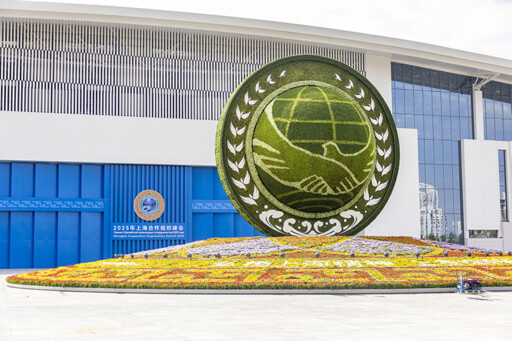


SCO 2025: Forging a sustainable future

Tianjin lights up the night for the SCO Summit Photo: IC PHOTO

Street views of Tianjin during the SCO Summit Photo: IC PHOTO
Since its formal establishment in 2001, the Shanghai Cooperation Organization (SCO) has undergone multiple rounds of enlargement, growing into one of the world’s most important international organizations. Twenty-four years on, the world is undergoing rapid and profound change. This is especially true in Eurasia, where most SCO member states are located—some suffering from the severe impact of regional conflicts, others deeply entangled in geopolitical disputes. The convergence of the SCO’s rapid growth and the unfolding of what has been called a “great transformation unseen in a century” has brought this young regional body to a historic turning point. How to address the risks and challenges brought about by fundamental changes in the international system and secure the SCO’s healthy and steady development while positioning itself as a pillar of global stability is increasingly the focus of discussion among both policymakers and scholars.
During the expanded meeting of the SCO, or SCO+ in Astana, Kazakhstan in July 2024, Chinese President Xi Jinping said “China proposes that 2025 be designated as the SCO Year of Sustainable Development so as to help us focus on fostering new forces for growth.” As China assumes the rotating chairmanship of the SCO in 2025, implementing this proposal and promoting the SCO’s sustainable development will become central to academic inquiry. Based on current circumstances and long-term objectives, I argue that policy efforts to promote the SCO’s sustainable development in the coming period should concentrate on three areas.
Upholding ‘Shanghai Spirit’ to strengthen cohesion
Over the past two decades, the SCO has defied repeated predictions of failure by Western commentators. Its membership has expanded from six to 10, while its areas of cooperation have extended from politics and security into trade, culture, health, education, and beyond. Today, the SCO family represents nearly half of the world’s population and about one-quarter of global GDP. The “Shanghai Spirit”—a shared set of values rooted in mutual trust, mutual benefit, equality, consultation, respect for diversity of civilizations and pursuit of common development—remains the fundamental reason the SCO has endured the shocks of major global and regional crises and continued to thrive.
This succinct formula not only reflects the traditional Eastern philosophy of “harmony without uniformity” and “harmony with all nations,” but also embodies a basic recognition of cultural diversity in today’s world. Guided by this worldview, the SCO has succeeded in bringing together states with very different cultural traditions, political systems, ideologies, economic sizes, resource endowments, and developmental paths. Through consultation and cooperation, its members jointly address security risks and explore models of mutually beneficial development. Precisely because it has adhered to principles of equality, openness, and shared benefit, the SCO has been able to offer a practical critique of Western geopolitical theories that view difference primarily as a source of conflict. It has advanced new visions of development, security, cooperation, civilization, and global governance across its region. As Nurlan Yermekbayev, who assumed office as SCO Secretary-General in January 2025, observed, the consistent commitment of member states to the Shanghai Spirit has attracted growing international attention, steadily expanding the SCO’s circle of partners and friends.
Innovating cooperation mechanisms and diversifying models
As the SCO has expanded, internal diversity has become increasingly evident. Member states already differed in their expectations and needs regarding regional cooperation, and these differences have become more pronounced with the SCO’s enlargement. At the same time, the international system is undergoing major adjustments, while global economic patterns are experiencing structural changes, with global supply and industrial chains being reshaped. One defining characteristic—and challenge—of SCO economic cooperation is that its members occupy very different positions in the international division of labor. Under the combined influence of internal and external factors, differences in interests have been magnified.
As a multilateral organization that places equality at its core, the SCO treats all member states as equals, regardless of size or strength. The Charter of the Shanghai Cooperation Organization stipulates that the SCO member States shall adhere to the principle of “equality of all member States, search of common positions on the basis of mutual understanding and respect for opinions of each of them;” “gradual implementation of joint activities in the areas of mutual interest,” and that “the SCO bodies shall take decisions by agreement without vote and their decisions shall be considered adopted if no member State has raised objections during its consideration (consensus).” While these provisions represent a novel form of interstate relations, they can also create tensions with the need for greater efficiency in practical cooperation. To overcome this bottleneck, the SCO Secretariat and member states are actively exploring innovative approaches aimed at balancing fairness with efficiency. While maintaining political equality among members, the SCO seeks to broaden tangible cooperation in security, economic, and cultural domains, thereby enhancing cohesion and influence.
Over the past decade, China has been instrumental in promoting “SCO+” and “China–SCO+” cooperation models, which have been widely adopted and well received. At the Bishkek Summit in 2013, President Xi said that “China will set up China-SCO International Judicial Exchange and Training Center at the Shanghai University of Political Science and Law.” Since then, China has launched platforms such as the China-SCO Local Economic and Trade Cooperation Demonstration Area (2018) in Qingdao, Shandong Province, the SCO Demonstration Base for Agricultural Technology Exchange and Training (2019) in Yangling, Shaanxi Province, the China-SCO Technology Transfer Center (2020), and the China-SCO Big Data Cooperation Center (2023). Guided by a “pilot first, focused promotion” principle, these initiatives have shared Chinese wisdom, expertise, and technology with SCO members, creating a new model of pragmatic cooperation underpinned by equality and consultation. This represents a significant policy innovation in China’s diplomacy, injecting vitality into the SCO’s sustainable development by offering members a tangible sense of benefit.
Indeed, the SCO Charter already stipulates that “Should one or several member States be not interested in implementing particular cooperation projects of interest to other member States, non-participation of the above member States in these projects shall not prevent the implementation of such cooperation projects by the member States concerned and, at the same time, shall not prevent the said member States from joining such projects at a later stage.” The SCO’s establishment and development has been a continuous process of innovation. Sustained commitment to innovation in response to international change and the evolving needs of members is what ensures the SCO’s vitality and sustainable growth.
Engaging ‘Global South’ and integrating emerging economies
Today, the Global South is collectively on the rise. While definitions of the term vary—whether by geography, stage of economic development, or geopolitical positioning—there is broad agreement that it constitutes a powerful new force in global governance. The SCO is naturally linked to this group, as most of its members are developing economies that share a strong interest in global governance and in maintaining stable regional economic environments. If BRICS can be seen as the vanguard of the Global South, the SCO may rightly be regarded as one of its core engines. Indeed, several SCO member states are also BRICS members. Broadly defined, the “SCO family”—encompassing member states, observer states, and dialogue partners—includes around 70% of BRICS members.
As some Russian scholars have noted in the wake of the Kazan BRICS Summit, this overlap is likely to deepen: For many Global South countries, joining the SCO signals autonomy and independence, while the organization is treated as a priority platform for security cooperation. Today, nearly all Gulf states have joined the SCO as dialogue partners, reflecting growing confidence in this non-Western regional framework.
Other scholars, analyzing intensifying geopolitical competition in Eurasia and the SCO’s future path to sustainable development, argue that the SCO will become a key force in advancing the development of the Global South. The SCO’s experience of maturation and growth has offered Global South countries an alternative, collective path to modernization through regional cooperation—one that differs from the Western model.
This, without doubt, constitutes the SCO’s most tangible contribution to the collective rise of the Global South, and represents a more fitting pathway for its deeper participation in global governance.
Xu Tao is a distinguished research fellow from the Euro-Asian Social Development Research Institute at the Development Research Center of the State Council.
Editor:Yu Hui
Copyright©2023 CSSN All Rights Reserved